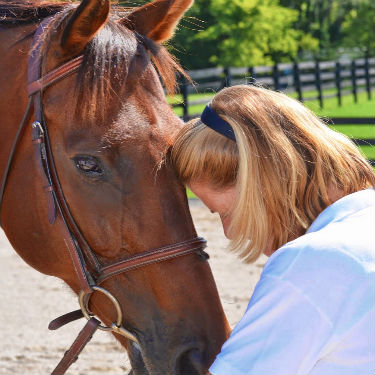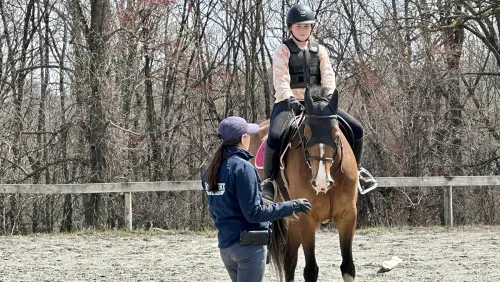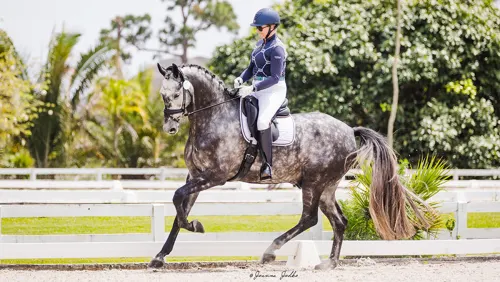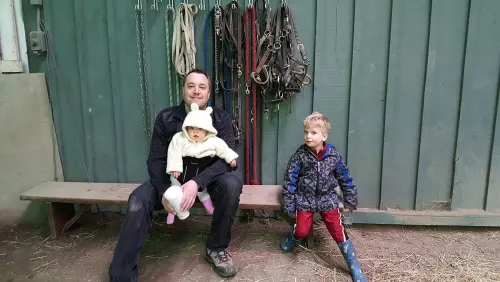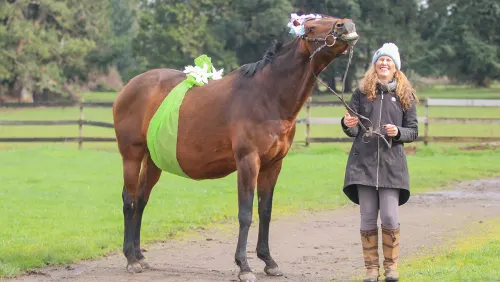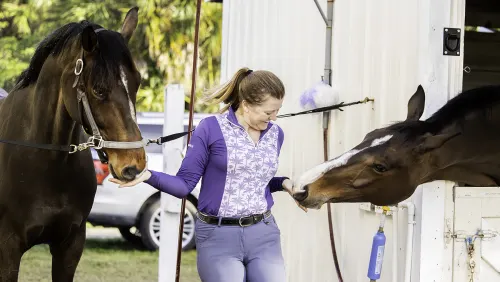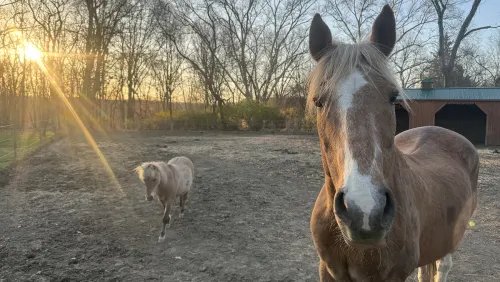From the very first, I knew Noah would be a project. Given that off-the-track racehorses are a dime a dozen these days, my decision to take him may have seemed profligate.
(Read all about how Noah came into my life here, in the first entry of my blog.)
But I am committed to helping Thoroughbreds that can be ambassadors for the breed in any equestrian sport at any level. All racehorses need some re-schooling and some physical therapy. At the Makers Mark Secretariat Center, horses receive both. No doubt I could adopt out a lot more horses if I didn’t invest the time to heal them physically and emotionally. Nor does my ethos of transparency make for quick “flips.” But so much of all that is good in my life has come about because of horses, I feel called to be their defender and champion whilst they are in my care.
In the long run, however, taking Noah on made “cents.” He was a lovely horse. He was service- and people-oriented. He had the support of his former owners. Yes, the expenses of rehab and re-schooling would add up over the six to nine months it might take to ready him for a new career and home. But at 8 years old, he was still a relatively young horse. He could live another 20 years or more. To retire him for life might cost, conservatively between five and seven grand annually. That could be $100,000 to $140,000 of accumulated costs for one retired horse!
The argument that $5,000 to $6,000 spent now with the hope that this expenditure would get him off the payroll and happily placed in a new home with a different job, seemed fiscally sound. I am very lucky that Noah’s owners agreed with me. I wish there were more owners who would support reschooling efforts not just because it is a noble thing to do, but because it is ultimately cost-effective. And it would foster a treasure trove of popular good will, undermining the sensationalist value of druggie/neglect/slaughterhouse tales that threaten to ultimately alienate popular interest in racing.
Besides, most Thoroughbreds enjoy work.
Noah certainly did. He liked to train. He loved to run. And he did so successfully for a long time. It made sense to me that he might thrive in a new career.
It was a chilly, gray day in February when Noah arrived at the MMSC. Ribby, shaggy, and dull coated, he was, but his eyes shone with eagerness and kindness. It was touching. I didn’t know what the next few months would bring, but I was certain that this horse was special.
The first task was to address his physical state and assess his soundness. I called Dr. True and asked him to evaluate Noah with flexions and X-rays. I wanted fecal count and CBC (complete blood count) baselines. I called our feed specialist from Nutrena, Rob Martin and asked him to give an opinion on Noah’s weight and condition and to recommend a feeding/supplement protocol. Appointments with the dentist, the farrier and the equine chiropractor/acupuncturist were scheduled.
None of the reports were earth shattering: Noah had been severely stressed and he needed time and TLC to bring him around. I had worried most about what the flexions and the x-rays would reveal. They too, held no big surprises. A few inconsequential chips in ankles, sore hocks, uneven on the right hind. Given the amount and intensity of his racing, his joints were surprisingly clean.
“Go on with him, Susanna.” Dr. True said. “He’ll tell you want he can and cannot do.”
ADVERTISEMENT
The chiropractor adjusted his poll, his neck, his withers, back and pelvis, and released the strain of lots of constricted muscles. “He has a spleen deficiency,” she added after finishing his acupuncture treatment. “That’s why his coat is so dull.” She prescribed Chinese herbs and put him on her schedule for regular check-ups throughout the spring.
Within two months, Noah started coming around physically. His coat started to shed out and a silky undercoat appeared. His belly started to slim down and tuck up. His flanks and neck showed outlines of musculature in the making. I worried that he couldn’t seem to hold adjustments in his pelvis, that he was somewhat peg-legged in the left stifle. But he seemed happy.
I asked the interns to give him regular laser treatments. I asked his owner to rent him a magnetic blanket. We have a wonderful volunteer who donates her reiki services to the MMSC. She worked on Noah. Dr. True injected his hocks. We added Lubrysin to the joint supplement he was already getting.
We also worked him. From the first snowy morning in early March when we took him out to do natural horsemanship and bomb proofing, Noah was an exemplary student: Willing, smart, level-headed. The one problem that we had with Noah was that he tried TOO HARD. He was the kind of horse that would run on three legs if you asked him.
When he first arrived at the MMSC, I thought he would make a lovely “little old lady’s horse.” It was apparent after the first week of riding him that Noah only wanted to do what he did well—RACE. He wasn’t hot by temperament. He was a, noble minded, well-mannered, warrior-athlete. You had to love a horse like Noah.
And loved he was! Nick Zito trained Noah in his early years, and when Zito’s son Alex came to the Horse Park this May to help his mother put on a Thoroughbred show, Alex made a point of coming up to the MMSC with his wife to see Noah.
“I always really, really liked No Where To Hide,” Alex said. “He had a great personality. He always tried. The fact that he ran in the Kentucky Derby is pretty wonderful too. He just was a very special horse. I am glad he is here at the MMSC.”
A month earlier, Noah’s former exercise rider had uttered almost identical words. “As an older horse, No Where To Hide moved from Nick Zito’s barn to my boss’ barn, where I am assistant trainer,” said Stuart. “He had a really big heart and a great personality. He was tricky to exercise because he always tried too hard. We would do two- or three-mile trot sets and gallops the wrong way around the track to keep him fit. That’s because when you galloped him the right way, he was REAL strong. He’d give you his all. He was willing to run every time he set foot on the track.”
“Not only that he was just such a level-headed and kind horse to be around. You never had to worry with him. He’d take care of you. You could always trust him, which is more than you can say for many of the horses, especially the older ones! Everyone in the barn loved him. You couldn’t not love him. I know you can lose horses in claimers and therefore I try not to get too attached to them, but when No Where To Hide got claimed in an optional allowance-claiming race. I was really, really angry. I came back to the barn and cried.”
“I couldn’t talk to anyone. My boss knew how upset I was and he assured me that the owners would claim him back. I tried to keep up with him as I could and when one day I didn’t see him showing up on any tracks, I asked the racing manager if he knew what had happened to him. I was told that the owners had gone after him and that he was at the Secretariat Center. As soon as I could, I had to come see him again.”
I walked Stuart and his wife to Noah’s stall. “Here he is.” I stood back as Stuart slipped through the door.
ADVERTISEMENT
“Hey Grandpa,” he said, his voice soft and warm, his eyes moist.
Noah pricked his ears, stepped up to him and pushed him gently with his nose.
“You’ve had a hard time, haven’t you Old Man,” Stuart said as he stroked Noah’s neck and kissed him on the cheek.
Noah laid his head on Stuart’s chest as if saying, “Nah, I’m ok, Stu! No worries!”
“Why don’t you adopt Noah, Stuart?”
Stuart wished he could but he felt that his nomadic life made it impossible. “I know you’ll take care of him, Susanna. You’ll find him a good home…right?”
“Yes, Stuart, I will take care of him. And I promise I will let you know when Noah finds his person. And beyond that, I will put you in touch with that person, so you two can be friends and you can go visit Noah in his new home.”
By the time June rolled around, Noah was starting to look respectable. He wasn’t 100 percent sound yet. And he still bolted when cantering to the left in the ring. Trail rides could be hairy—lots of enthusiastic head tossing and jigging sideways or a racy trot threatening a potent outburst of canter at any subsequent moment. Definitely not an old lady or even a gutsy kid horse yet! Noah knew and only wanted to be one thing: A racehorse. And not just any old racehorse. A warrior/athlete racehorse. A fight to win/do so until your body breaks or your heart bursts racehorse. Push through pain. Make it happen. I don’t know if that could ever be completely trained out of him or if you would even want to.
So who would be the right person for this special horse, Alex’s, Stuart’s and MY special horse? And when, if ever would that person appear?
All I could do was wait, hope, and keep the faith. Loving Noah was the easy part.
Susanna Thomas, director at Maker’s Mark Secretariat Center, has a lifetime of experience in horsemanship, journalism and civic work. Raised in New York and Europe, Susanna has a degree from Princeton University in Comparative Literature. Her blogs are originally posted here.

